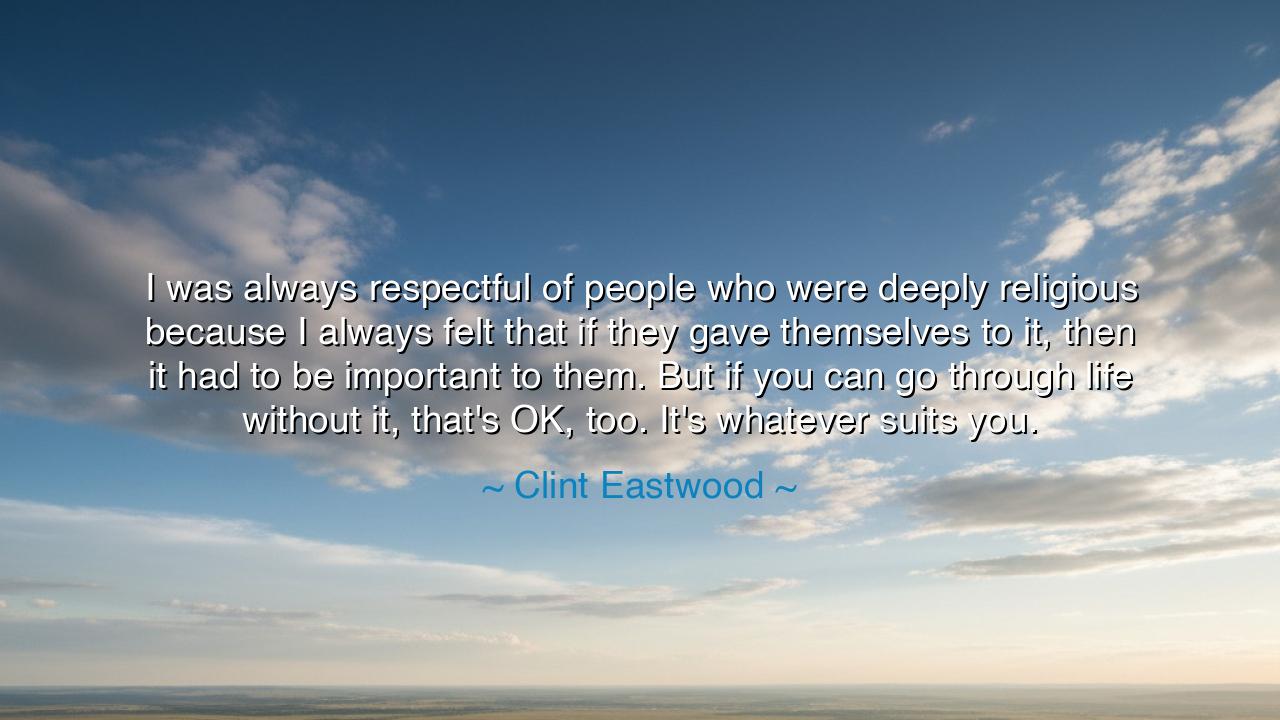
I was always respectful of people who were deeply religious
I was always respectful of people who were deeply religious because I always felt that if they gave themselves to it, then it had to be important to them. But if you can go through life without it, that's OK, too. It's whatever suits you.






“I was always respectful of people who were deeply religious because I always felt that if they gave themselves to it, then it had to be important to them. But if you can go through life without it, that's OK, too. It's whatever suits you,” said Clint Eastwood, the stoic voice of an age that prized quiet strength over noise, and sincerity over spectacle. In these words, Eastwood offers not a sermon, but a reflection born from wisdom — the kind that comes not from books, but from watching life unfold in all its contradictions. His quote is neither a defense of faith nor a rejection of it, but a call for respect, for understanding the many paths that lead a soul toward meaning.
Eastwood, a man who has portrayed both heroes and outlaws, prophets of justice and wanderers of silence, speaks from a place beyond ideology. His words capture the essence of a timeless truth: that the human spirit is vast, and the ways it seeks peace, purpose, and truth are as varied as the stars above. For him, to be deeply religious is no less noble than to walk without creed — for both require courage. The first surrenders the self to a higher power; the second bears the weight of existence alone. In both, there is integrity — the honest facing of one’s own beliefs or the absence of them.
The origin of such thinking lies in the philosophy of balance — a wisdom older than any scripture. The ancient Greeks spoke of sophrosyne, the harmony of the soul that comes from moderation, from understanding one’s nature without excess or disdain. Likewise, Eastwood’s sentiment mirrors the spirit of the Tao: the Way that honors both the believer and the skeptic, the temple and the open sky. For what matters, he implies, is not whether one kneels or stands, but whether one lives truthfully, without arrogance or hypocrisy.
History has seen many souls who, like Eastwood, revered the sincerity of belief while walking their own path. Consider Abraham Lincoln, who, though not a man of formal religion, often spoke with reverence of divine will. He was humble before mystery, yet cautious of fanaticism. In his grief and solitude, he found a kind of spiritual truth that transcended doctrine — the belief that goodness, compassion, and justice were sacred duties, whether or not they came from heaven’s decree. In this way, Lincoln and Eastwood share kinship: both understood that faith is not a uniform garment to be worn by all, but a personal fabric, woven differently by each soul.
Eastwood’s words also challenge the division that often arises between believers and nonbelievers. He reminds us that respect is the bridge between worlds. For too long, humanity has warred over who holds the truth, forgetting that truth itself is not a sword, but a mirror — one that reflects differently depending on who gazes upon it. The wise do not mock the faith of others, nor do they impose their own. They understand that reverence, whether for God or for life itself, springs from the same longing — the desire to belong to something greater, to find meaning in the fleeting days of our existence.
To live by Eastwood’s teaching is to walk with humility — to see the divine in diversity. Whether you pray in a church, meditate in silence, or simply gaze at the stars and feel the smallness of your being, what matters is sincerity. The true measure of a person lies not in their creed, but in their conduct — in how they treat others, how they love, how they bear the weight of life with dignity. Religion, when genuine, refines the heart. Spiritual independence, when honest, purifies the mind. Both, in their best form, lead to peace.
So, dear listener, learn from the stillness within Eastwood’s words. Do not scorn belief, nor idolize disbelief. Let your reverence be wide as the sky. Honor the faithful who bow in devotion, and honor also the seekers who find holiness in the world’s simplicity. What matters is that you live your truth fully, without judgment, without fear — for life’s beauty lies not in sameness, but in the harmony of many paths converging toward wisdom.
And thus, remember: the highest form of faith is respect — for the divine, for the human, for the mystery that holds us all. Whether you call it Allah, God, Nature, or simply Life, walk your path gently, and allow others to walk theirs. For in the end, as Clint Eastwood reminds us, what matters most is not who was right or wrong, but who lived with grace — and who let peace, in whatever form, suit their soul.






AAdministratorAdministrator
Welcome, honored guests. Please leave a comment, we will respond soon